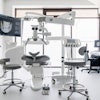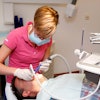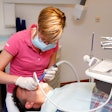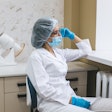
Healthy teeth and gums start before a baby is born, according to a session on oral health and pregnancy at the 2016 ADA annual meeting in Denver. The session focused on several ways dental practices can help both moms-to-be and newborns get and stay healthy.
General dentist Jeanette Courtad, DDS, and public health educator Alice Horowitz, PhD, teamed up to share their tips for educating pregnant women about their oral health and how to take care of their newborn's oral health. They also emphasized the importance of providing treatment to pregnant women, so they do not pass on bacteria to their child.
“They are encouraging us to do dental treatment before, during, and after pregnancy.”
"They [experts] are encouraging us to do dental treatment before, during, and after pregnancy," Dr. Courtad said. "What they are not saying is to disregard this major medical event in a woman's life."
While dental care is important for moms-to-be, more than half of women do not get dental care during pregnancy. In addition, nearly 60% of pregnant women don't get counseling on how to take care of their own oral health during their pregnancy or the oral health of their baby once they've given birth.
"There are no adverse effects of having dental care during pregnancy," stressed Horowitz, who encourages dentists to treat pregnant women.
6 steps
To help your practice do so, Dr. Courtad and Horowitz detailed six steps to help your team provide oral health literacy and dental care to pregnant women and newborns.
1. Ask the right questions
To find out whether a patient of childbearing age is pregnant, you're going to want to ask the right question, which is most commonly, "Has there been any change in your health history since your last visit?"
"Many women tend to be very forthcoming about pregnancy," Dr. Courtad said.
And when asking about a pregnant patient's or new parent's oral hygiene routine, avoid asking yes or no questions.
"You wouldn't say, 'Did you brush your teeth this morning?' " explained Horowitz, noting that patients are likely to say what you want to hear rather than the truth. "The better question is to ask, 'When did you brush your teeth last?' "
2. Know your audience
Most women of childbearing are going to be millennials, which is a generation with a lot of advantages but also some unique challenges, according to Dr. Courtad, who has two millennial children of her own.
For example, because millennials are tech-savvy and do internet research, they often come into the dental office with a large knowledge base. While most of that information is probably accurate, some may be from questionable sources. Therefore, it's your job to clear up what really are the best recommendations for pregnant women and newborns.
In addition, millennials like to be thought of as part of the healthcare team. While this can make them more willing to make changes, it also might mean you have to shift how you're giving your message.
"If you're sounding like you're preaching to them, it's not going to work," Dr. Courtad said. "Let them know what they're doing well, which is helpful for everyone in your practice, too."
3. Use living room language
The idea of using plain language that you might hear in a living room was a common theme throughout the session. Horowitz and Dr. Courtad both stressed that putting terms in a way patients can relate to will help them better understand what they're hearing.
"No need to say periodontitis when you can say gum disease. No need to say radiograph when you can say x-ray," Horowitz explained.
The living room language should also extend beyond speech into the environment, such as with educational materials, oral health posters, and consent forms.
4. Emphasize getting dental treatment and preventing decay
Treatment for both caries and periodontal disease are important for pregnant women, because parents can pass bacteria to their newborns.
"We want no open lesions for this mom to pass bacteria to her infant," Horowitz said. "We want mom's mouth to be healthy before she delivers."
However, even if a pregnant woman is decay-free, it's important for her to focus on prevention. Drinking fluoridated water is one way to help moms-to-be stay caries-free, she said.
5. Mom and dad as first dentists
Education for pregnant women is crucial, because parents are a child's first educators about oral health.
"We want to educate her that she's not only the mom, she's the first educator. She's the first dentist, so she takes on a huge role in preventing cavities," Horowitz said.
One way to do this is by teaching parents how to clean their child's mouth before their child is born, and then reinforcing that they should be cleaning a baby's mouth daily starting when they leave the hospital. Dental staff should also teach parents to lift a child's lip and look for white spots.
Pregnancy is also a good time to teach patients about other aspects of oral health, such as nutrition, flossing, or toothbrushing, because when women are pregnant, they are more receptive to oral health information than at any other point in their life, according to Dr. Courtad.
6. Listen to patients, and confirm what you heard
When you're teaching pregnant women how to care for themselves and their newborns, it's important to confirm they understood what you taught and to listen to what they say.
"Most important is to listen -- listen carefully, not interrupt," Horowitz said. "Ask the patient to tell you what she is going to do at home, and confirm it's what you, the provider, said to the patient."
Horowitz warned that you don't want to make it seem as if you're testing the patient, which can backfire.
Horowitz and Dr. Coutard ended the session by reinforcing that education and disease management before a child is born will help newborns start life with optimal oral health.
"If we do all this, we're hoping the baby has a wonderful first dental visit before or at the one-year mark," Dr. Courtad said. "By keeping mom disease-free -- and that's caries and periodontal disease -- she doesn't pass those bacteria on to her young infant, and that's how you keep her healthy."



















